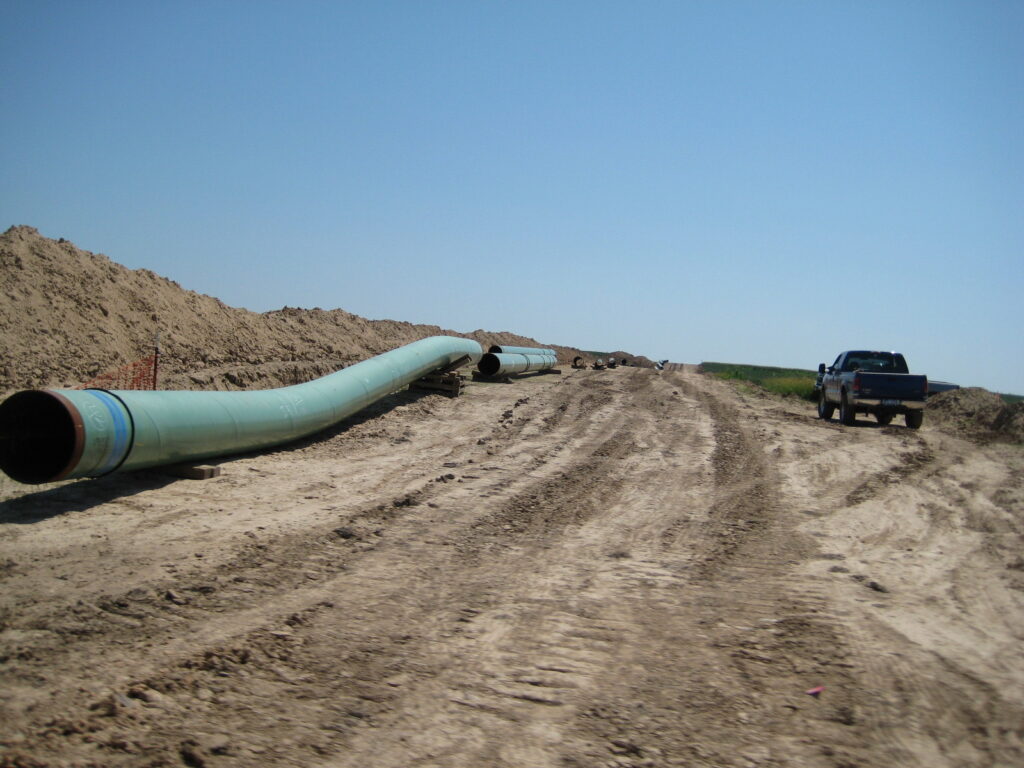My small farm is nearly in the path of a new pipeline that will carry huge tonnages of shale gas from West Virginia to the Mid-Atlantic states. My neighbors mostly hate the idea. Many farms have hostile signs saying “No Pipeline!” or “Save the County!”
All this fuss over one buried gas transmission line, a minor addition to the 200,000 miles of such pipelines already transporting natural gas in the United States. The county has electric power lines that are more visually obtrusive and carry more soil erosion risk. We apparently accept those intrusions because we all plug into the wall sockets. The shale gas pipeline, however, will initially carry most of its gas to the cities of coastal Virginia and North Carolina, so it is resented here. Big mistake.
One neighbor has a different banner. It reads, “Protect Our Future: Put the Pipe on My Land.”
Three years ago, I arranged a program about shale gas for my local Rotary Club. My guest speaker told of the huge benefits — jobs and wages — accruing in Pennsylvania as the Marcellus Shale is developed there. West Virginia, too, has Marcellus Shale. He noted back then that a pipeline from West Virginia had to be in our future — to get the gas out of the steep hills and into population centers near the coast. It would create even more economic growth and far more jobs, he noted.
As an economist, I read about billions of European Union (EU) investment dollars coming to expand the chemical, metal, and auto industries in the United States. That’s not surprising, since U.S. natural gas costs only one-third as much as the Russian gas now being imported into Europe. In addition, there is the now very real threat of Vladimir Putin cutting off EU gas exports to support his reforming of the old Soviet Union. The EU does not want to drill its own shale gas deposits, and in failing to do so, it suffers slower economic growth, heavier welfare payments, and the frightening scenario of watching its neighbors get sucked back into Russian control.
Americans benefit from cheaper energy that emits only half the CO2 of coal or oil. Plus, it creates many thousands of jobs to support American families in a time when unemployment and welfare costs are rising faster than we can support.
Fortunately, the right of way, after construction is completed, will be only 75 feet wide, just like a power line without the towers. During construction, there will be a 400 foot right-of-way. Our local landowners will lose the opportunity to subdivide a narrow strip of their land — but our market and our land laws do not support many new subdivisions in any case. For land that will lose the right to be subdivided, the pipeline payments will necessarily be larger — and immediate. True, some trees will be cut on private land, many against the wishes of the owners, but the alternative is to see communities such as Staunton, Virginia lose their vibrancy in the years ahead.
The fear of a threat to water quality is a talking point, and there are many private wells in this area. A “deep” water well may go down 600 feet. The shale gas wells are typically several thousand feet deeper. The only possible “threat” is right among the gas fields. A well casing not properly done can leak — but state inspectors already check for that.
Opponents also make dire warnings of pipeline explosions. Our new pipelines, however, are all built with PIG (pipeline inspection gauges) that check for cracks, debris, and metal loss from the inside. With the PIGs in place, I am in far more danger of a lightning strike than a gas pipeline explosion — even if the pipe is on my property. In contrast, coalmining deaths still kill about 100,000 people annually worldwide.
Two types of opponents ardently reject shale gas development. First are the NIMBYs. “Not in My Backyard” is a particularly unlovely reason to oppose roads, utilities, energy projects, and other vital infrastructure.
The Green opponents are even less lovely. They seem to dislike humans in general, and they certainly hate modern technology and energy even though they rely heavily on them. If shale gas is bad, why don’t they support expanded nuclear power, which emits no CO2 at all? So far, Green activists have been impossible to please.
The public has been willing to embrace rather insignificant practices, like recycling, that don’t get us closer to the “Green dream.” Fortunately, we have also been unwilling to renounce the modern world’s safety, energy security, and hope for the poor.
[Originally published at American Thinker]





